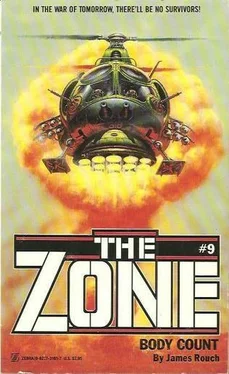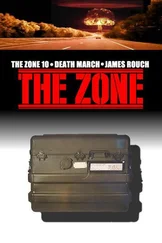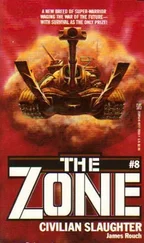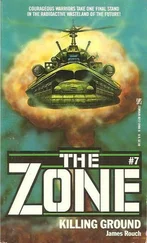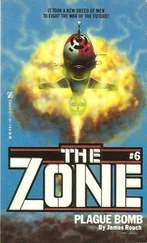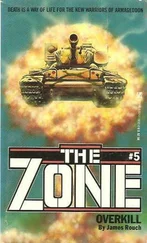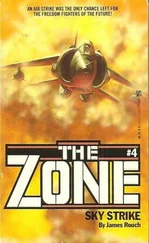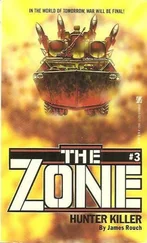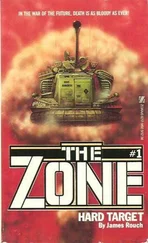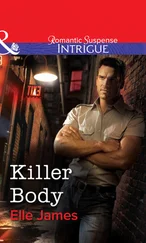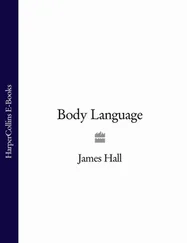“Major.” Boris hissed out the corner of his mouth as they went out. “In the last few hours, you have made me go up against drunken Spetsnaz, and sit in a room with ten SAS men. My bowels will not take what you are putting them through.”
“You’ll be okay. We’re finished with Munich. Transport is laid on. We leave as soon as we’re boarded.”
“Then my only regret is that it was not thirty-six hours sooner.” Going out through the front door, Boris walked straight into an SAS machine gunner draped with belts of ammunition. He jumped, apologized in Russian, and then went deadly pale as he realized what he’d done.
By the time Revell was outside, Boris was already two blocks away. Munich was returning to normal at an almost frenetic pace. Battalions of city employees were sweeping the streets, and squadrons of tow trucks removing burned-out, smashed, and abandoned cars. Damaged storefronts were being boarded over with sheets of pastel-coloured ply, giving the appearance of undergoing refit, rather than being hidden from the gawp of tourists.
True, there were more police on the street than was usual, but not exceptionally so, a few APCs parked in side streets, but that wasn’t such an unusual sight. Only the frequent roadblocks, where the identification of every man was double-checked, were out of the ordinary.
A few side streets were cordoned off, and the taint of smoke hung over the city, but the smell permeating the pedestrian malls was more likely to come from hot dog stalls and hamburger stands than buildings being damped down.
The main railroad station was still closed, after the destruction of its signal cabin by an overenthusiastic application of force by an SAS team. It was by truck that the Special Combat Company was to be moved.
There was no one to see them leave, bar the passing pedestrians, and they took no notice of so common a sight. The last men were climbing aboard, when a military police station wagon pulled up in front of the lead vehicle. Two police cars boxed in the little convoy at the back.
“Bloody hell.” From the back of the tail-end Bedford, Scully watched the police approach their officer. “This doesn’t look like a social visit.”
“Perhaps they’re going to bill us for any damage we’ve done.” Burke’s tone was caustic.
“Sure as fuck they haven’t brought a vote of thanks from the city fathers.” Dooley watched the conversation between the major and the officers. It was short, almost curt. During it Revell’s expression hardened. At its conclusion, he laid his submachine gun on the ground and emptied a pocket of shells. An MP pointed to his holster, and when Revell shook his head, a police officer stepped forward and reached for the pistol.
“They’re arresting the major!”
The shout Dooley gave as he jumped out was heard along the line of trucks. Suddenly every member of the company was leaping down and making for the rear of the convoy.
Seeing the numbers advancing on them, the police fell back to their cars. For a while, the four MPs stood their ground, until they were pushed and jostled against a store window that bowed ominously under the pressure. One of them tried to draw his side arm, but had it wrenched from his hand, unloaded, and then thrust back at him hard.
Two of them pulled their clubs, but those too they were relieved of, but those weren’t returned, disappearing instead into the encircling crowd.
Civilians, sensing trouble, scurried away. A police officer attempting to use his car radio had the handset pulled from his grasp and ripped out, complete with its coiled lead.
“Hold it, hold it.” Revell had to bellow at the top of his voice to make himself heard above the threats being hurled at police and MPs. “Back off, all of you.”
The pile of firearms on the sidewalk grew as the men handed in the weapons they had obtained in the city. Revell stood to one side, watching the process.
In turn each man would step forward, unload, show the breach of his weapon was empty, and add it to the stack. The first few had thrown the rifles and submachine guns down hard, obviously hoping to damage them. When the lieutenant in charge of the military police detachment protested, Revell had to order more care taken.
It was an impressive collection, and the assortment of grenades and ammunition beside it was no less daunting.
“That’s everything. We can go now?” Revell got no reply. The police were totally absorbed in worried contemplation of the heap of ordnance they’d suddenly inherited. “Oh, one last item.”
The police jumped back in alarm as a tattered flak jacket landed among, and scattered, bullets and bombs.
It was as they started to drive north out of the city, that Revell began to realize just what effect the Russian assault had created. The road was packed with vehicles of every description. Anything that would drive, and for which fuel could be found, was taking part in a huge exodus.
Every car, truck, and bus was piled high with luggage, and packed tight with passengers. Bumper to bumper the traffic crawled away from Munich.
At the cost of two hundred troops, the Soviets had crippled a vital war production centre. Many of those leaving had not been anywhere near the fighting that had taken place. The majority had at most only seen the smoke or heard a faint echo of the gunfire.
This fleeing mass was on the move because its nerve had snapped. Living on the edge of the Zone for so long had taken its toll. The carefully calculated attack, its surgically precise objective had succeeded and been achieved.
Munich wasn’t going to disintegrate, not today, perhaps not next month, but inevitably it would. The Oktoberfest would go on, starting a couple of days late. Attendance would be down, but probably not noticeably so, considering what had happened.
In days the scars of battle would be gone, the blaring headlines forgotten by all but .those who lost family or friends, or whose business had suffered.
What was beyond recovery was the production at the armaments factories. Many immigrant workers would shift to other production centres, but a significant proportion would be lost, returning home.
And those who stayed, those without the courage to uproot themselves, or those too stubborn to do so, they would be looking over their shoulder all the time they worked. They would worry about their families, about their future.
From this time onwards, the Warpac bombers would only have to stray a few meters outside of the Zone to trigger an air raid warning. The inevitable reaction in Munich would shut down the city for hours or even days.
The convoy moved slowly north. In an hour they had covered barely six kilometres. They were still within the city’s suburbs.
Riding in the cab of the leading truck, Revell gradually became more and more aware of the driver’s preoccupation with the temperature gauge. He wasn’t surprised when they pulled off the road and on to the forecourt of a service station.
While their truck joined the queue for the water hose, Revell waved the rest of the column to park on the verge. Many of the men took advantage of the stop to stretch their legs. Several also took the opportunity to go behind a paling fence and relieve themselves.
A few private cars were also pulling in to fill up at the pumps. Revell watched them idly while he waited. It was a self-service gas station, and after getting out, each driver would go through much the same ritual.
After unlocking their filler caps, they would look at the pumps. Inevitably noticing that the previous sale was still registered, they would look towards the pay booth. A short impatient wait would be followed by a fruitless visit to the cash desk, and then a return to the car.
Читать дальше
